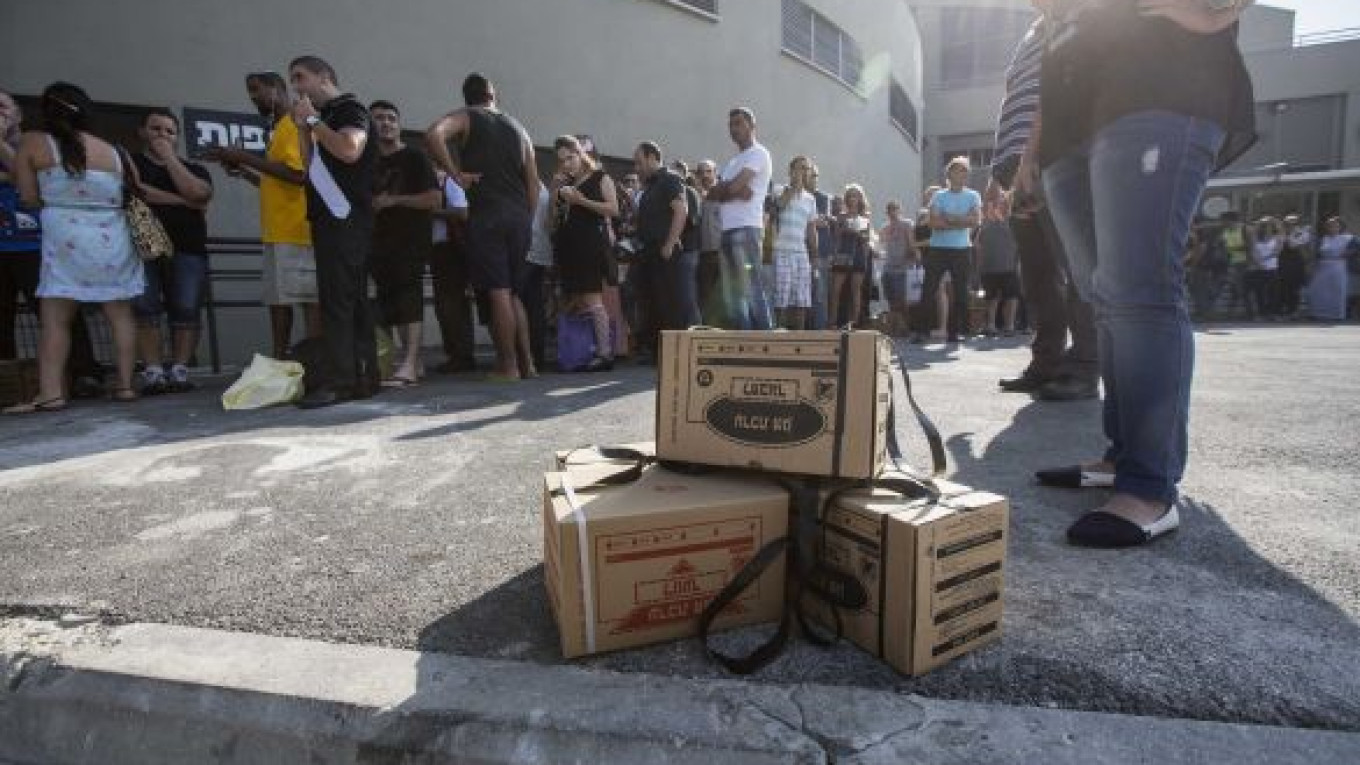Russia announced Thursday plans to increase its Navy presence in the Mediterranean as ships from the U.S., Britain and France stood by to await orders in case of a military strike on Syria.
Calls for military intervention intensified in the aftermath of an alleged chemical attack in the Damascus suburb of Eastern Ghouta on Aug. 21, which the U.S. and Europe believe was carried out by the Syrian government and Russia says was done by Syrian rebels in an attempt to lure the West into war and derail peace talks planned for September.
As fears of an imminent strike Thursday prompted some Syrians to evacuate and Israelis to line up for gas masks, French media reported that the country had sent a ship to the Mediterranean to join the U.S. and British ships and submarines that are already located on the territory of Turkey — which announced Monday its intention to take part in the attack — and Jordan. ?
It was in this context that an unidentified source in the General Staff of the Armed Forces told Interfax that escalation in Syria required Russian forces to increase the Navy's presence in the region, while RIA Novosti cited an unidentified high-ranking official who said the move was not related to the Syria crisis and had been in the works for some time now.
Alexander Khramchikhin, a military expert with the Institute for Political and Military Analysis, said Russia's decision to increase its presence in the Mediterranean was meant as a "psychological trick" to keep Western forces from attacking Syria.
This trick is the most serious measure Russia is ready to take, however, and the chance of a military confrontation between Russian and Western forces is "exceedingly unlikely," he said.
Since July 1, four combat teams of the Russian Navy have been located in the eastern and western parts of the Mediterranean Sea. A Naval Forces official told Interfax earlier this week that the Russian Navy was prepared to protect Russian interests in the region if Western forces attacked Syria, but it had not received any orders for military action.
Meanwhile, Europe seems to have taken a step back from plans for an immediate intervention, with Britain's Labour Party insisting that the decision must be postponed until results of the UN chemical weapons team — working at an alleged site of the attack since Monday — are announced. France also said it needed proof of a chemical attack to begin a military operation.? ?
Speaking in Vienna on Thursday, UN Secretary General Ban Ki-moon said the UN team expected to finish its investigation Friday and report on it Saturday.
The Labour Party's Ed Miliband told the British Parliament that he did not want the mistakes of the 2003 Iraq invasion to be repeated in Syria.
U.S. Defense Secretary Chuck Hagel said Thursday that the U.S. would implement the attack only if its allies supported it.
Khramchikhin said that if the U.S. does carry out an attack, the most likely strategy would be a single-shot cruise missile attack.
"They aren't ready for any other attacks; no military groupings were created," he said.
According to Igor Morozov, a member of the Federation Council's international affairs committee, an intervention could put the radical Islam opposition in power in Syria, which eventually could threaten Europe and Russia.
"Those well-armed militants will start to act in the EU countries and will create a similar threat to Russia," he said, adding that he feared the militants could come to Russia's turbulent North Caucasian region.
Meanwhile, according to Al-Arabia TV channel, Syria's Armed Forces started to evacuate soldiers from Damascus, and The Washington Post reported that most people had not shown up to work and the city's streets were empty.
Contact the author at e.kravtsova@imedia.ru
A Message from The Moscow Times:
Dear readers,
We are facing unprecedented challenges. Russia's Prosecutor General's Office has designated The Moscow Times as an "undesirable" organization, criminalizing our work and putting our staff at risk of prosecution. This follows our earlier unjust labeling as a "foreign agent."
These actions are direct attempts to silence independent journalism in Russia. The authorities claim our work "discredits the decisions of the Russian leadership." We see things differently: we strive to provide accurate, unbiased reporting on Russia.
We, the journalists of The Moscow Times, refuse to be silenced. But to continue our work, we need your help.
Your support, no matter how small, makes a world of difference. If you can, please support us monthly starting from just $2. It's quick to set up, and every contribution makes a significant impact.
By supporting The Moscow Times, you're defending open, independent journalism in the face of repression. Thank you for standing with us.
Remind me later.


